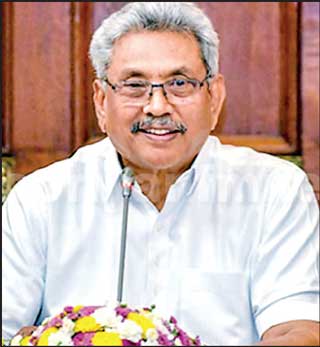Monday Feb 16, 2026
Monday Feb 16, 2026
Wednesday, 13 October 2021 00:00 - - {{hitsCtrl.values.hits}}
By Charumini de Silva
 |
| President Gotabaya Rajapaksa
|
Senior Cabinet Ministers yesterday defended President Gotabaya Rajapaksa’s recent remarks on shortcomings under his administration, citing it was a sign of humility, not weakness or failure, and that it did not signify the end of the Government.
“Admitting shortcomings is a humble quality. It cannot be defined as a failure or the end of the Government,” Cabinet Co-Spokesman and Mass Media Minister Dullas Alahapperuma said in response to a query posed at the post-Cabinet meeting media briefing yesterday.
On Sunday, the President, delivering the keynote speech at the 72nd Army Day, said: “We have done a lot of work for the people under these circumstances. The people may have a sense of displeasure towards me and the Government for not delivering as they expected. I accept that. Not only me, but all Ministers and MPs should accept it.
“However, I promise on behalf of the people that we will move the country forward with new vigour by controlling the COVID pandemic and by opening up the country under new normalcy. Everyone needs to work together for this purpose.”
Alahapperuma clarified that the President had never admitted to failure, but rather made a humble self-criticism for not being able to fulfil the wishes of the 6.9 million people who placed trust in him.
“This is a very democratic Government. Exchange of views and criticism are part of it and a great sign of a healthy democracy,” he said.
Recalling the dictatorship-rule era, Alahapperuma said the self-criticism of the President was merely a sign of great humility from a leader and his loyalty towards his fellow countrymen.
Trade Minister Bandula Gunawardena too reiterated that it was not reasonable to define either the President or the Government as a failure.
“The President was handed the economy in an inefficient and cumbersome manner, one which was only driven backwards for five years,” he claimed.
Gunawardena charged that Sri Lanka’s economy experienced the worst era post-Independence from 2015 to 2019 under the ‘Yahapalanaya’ regime.
“I challenge the Opposition to prove me wrong,” he said, claiming that Sri Lanka witnessed the ‘golden era’ of economic growth under the leadership of then President and current Prime Minister Mahinda Rajapaksa from 2010-2014.
As per Gunawardena, Sri Lanka’s gross domestic production (GDP), which was only around $ 20 billion, soared to $ 79 billion, but the previous regime was only able to expand the economy by $ 4 billion during their time.
He also claimed that the ‘Good Governance’ regime had sold the most promising investment projects in the recent history – Colombo Port City and Hambantota Port, for $ 1.4 billion each – for a total of $ 2.8 billion, which is less than the income generated by the tourism industry in a year pre-COVID ($ 4.3 billion in 2018).
“The President was given an economy that was hampered by all key sectors, including tourism, which was adversely impacted post-Easter Sunday attacks,” he said.
Gunawardena said the impact of the pandemic has been unprecedented, and that it is a global economic crisis the world as a whole is grappling with.
Despite the state of the economy, he also noted that the Government took proactive measures to secure and administer COVID vaccines to over 60% of the total population.
In a separate meeting, Industries Minister Wimal Weerawansa said that, as a people-elected Government, they all have a responsibility and a duty to rectify the existing shortcomings and move the country forward successfully.
“We acknowledge the limitations we as part of the Government had to deal with because we are dealing with an unprecedented economic situation in the post-COVID pandemic. Certain objectives were achieved, some were missed, and some that were not in the plan were completed, such as digitalisation. The important factor here is that we were open about it, and we still have time to change this situation to achieve the desired goals,” he said.
He reiterated that economic hardships were being faced by the entire world today, irrespective of the size of each country’s economy.
“Global trade was disrupted; the costs of raw material, logistics, transport and manufacturing increased significantly, disrupting entire supply chains.”
Weerawansa however said it was not impossible to win over the confidence of the people in the next three years, highlighting the need to identify and assess the drawbacks, whilst ensuring no repetition of mistakes.
